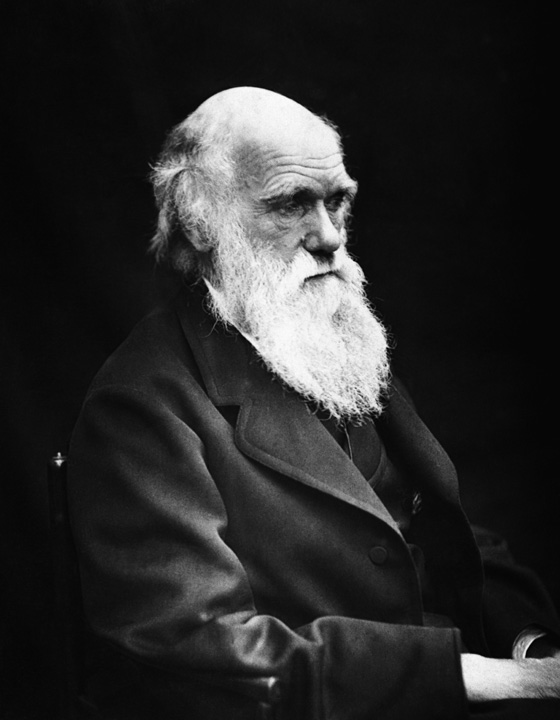About Charles Darwin
by Daniel Nickrent
 |
Charles Robert Darwin (1809-1882) was born in Shrewsbury, Shropshire England on February 12, 1809 in a family of remarkable intellectual distinction. His father was a physician and his paternal grandfather was Erasmus Darwin, the well-known author of "The Botanic Garden." Darwin "failed to profit" at either Shrewsbury or later at Edinburgh University where he studied medicine. In 1827 he entered Christ's College, Cambridge where he developed a close relationship with John Henslow, a professor of botany. Henslow is the one who got him to go on the expedition of the HMS Beagle which circled the globe (starting 1831, ending in 1836) and brought Darwin into contact with many habitats where he studied geology, zoology, botany and more. During the voyage, Darwin read 'Principles of Geology' by Charles Lyell which proposed that fossils were evidence of plant and animal life that lived thousands or millions of years ago. These ideas planted the seed in Darwin's mind when he encountered living animal diversity and fossils in South America. Most noteably, his observations on the Galapagos Islands (500 miles west of Ecuador) of different species of finch and tortoise on geographically separated islands, were later formulated into his theory of evolution by natural selection. |
Was Darwin the first to propose evolution by natural selection? Others before him had "partial anticipations". In fact, Darwin acknowledges many of these in an introductory part of his Origins. It is clear from this section that the scientific and even some of the theological world were ready for Darwin's ideas. It has been suggested that he delayed writing The Origin of Species because of Robert Chambers' (published anonymously) Vestiges of the Natural History of Creation, which because of its evolutionary interpretation of nature, received condemnation from religious sorts. This book was very popular, however, with a grand total of 14 editions!
Darwin was spurred into
action (20 years after the voyage of the Beagle!) to write On the
Origin of Species by Means of Natural Selection,
or the Preservation of Favoured Races in the Struggle for Life
[usually abbreviated as The
Origin of Species or just Origins]
when in 1858 he received a letter from Alfred
Russel
Wallace enunciating an evolutionary mechanism nearly identical
to his own. Wallace's paper was read at
the Linnaean Society meeting on July 1, 1858 as were Darwin's papers
and letters to Asa
Gray (from 1857).
Both Darwin and Wallace were heavily influenced the work On Population by Thomas Malthus (1831). The main idea is that populations will increase geometrically until food and other environmental factors limit this growth. The theory of evolution by means of natural selection (as the mechanism) can be summarized as follows:
•
Individuals variation (not saltations) were present in all
organisms and were important for evolutionary change.
• Natural checks would limit the
geometric increase in population size (Malthus).
• As a consequence of the above, only
some individuals survive and these are the ones that carry particular
traits that influenced their survival.
• Because those individuals with
adaptive traits survive, they pass these on to the next generation (in
a genetic senses, they contribute more genes to the next generation).
• This selection process continues over
many generations and in a changing environment the variants replace
the original organisms.
During Darwin's time, there were criticisms of his views such as the following:
- Saltation. Others, such as Asa Gray believed saltation WAS an important factor.
- Mechanism of heredity. Blending (which Darwin believed) vs. the Mendelian particulate mode of inheritance would lead to dilution of any variant by backcrossing with "typical" forms.
- Effect of chance. Variants too few to affect large populations (related to above concept).
- Limits of variation. How far can natural selection go? Can it only act on existing structures? If so, how can novel organs be formed? Classic examples discussed are eyes and orchids.
- Role of isolation. Can speciation occur without physical isolation or is this a requirement? This topic is still active today (cf. allopatric, parapatric, and sympatric speciation).
- Age of earth. Historically, the age has gotten progressively greater. Biblical (4004 years), Kelvin (400,000 years), modern (4.6 billion years). Using Kelvin's value, some argued that there was insufficient time to produce all the biotic diversity seen today using Darwin's "slow" process.
With regard to species and classifications, Darwin's view of species differed from those before him (such as Ray and Linnaeus) which were more typological. Darwin had trouble defining species and resorted to the classic definition "a species is what a competent taxonomist says it is." He gave examples in plants where species, subspecies, etc. are difficult to define such as Rubus (blackberries), Rosa, Hieracium (hawkweeds), and Quercus (oaks). He also noted that hybrids are not universally sterile. Darwin expressed difficulty in defining species precisely and indicated that one should treat species in the same manner as genera, i.e. as artificial constructs. Darwin made it clear that natural systems of classification do not reflect the "plan of the Creator" but are founded on descent with modification, i.e. a genealogical or evolutionary explanation. Interestingly, the only figure present in Origins is a phylogenetic tree
Was Darwin religious? To some degree, Darwin did waver in response to pressure from religious groups after the first edition of Origins. For example, the phrase "by the Creator" was inserted in the last sentence of the book in its second edition:
"There is grandeur in this view of life, with its several powers, having been originally breathed [by the Creator] into a few forms or into one."